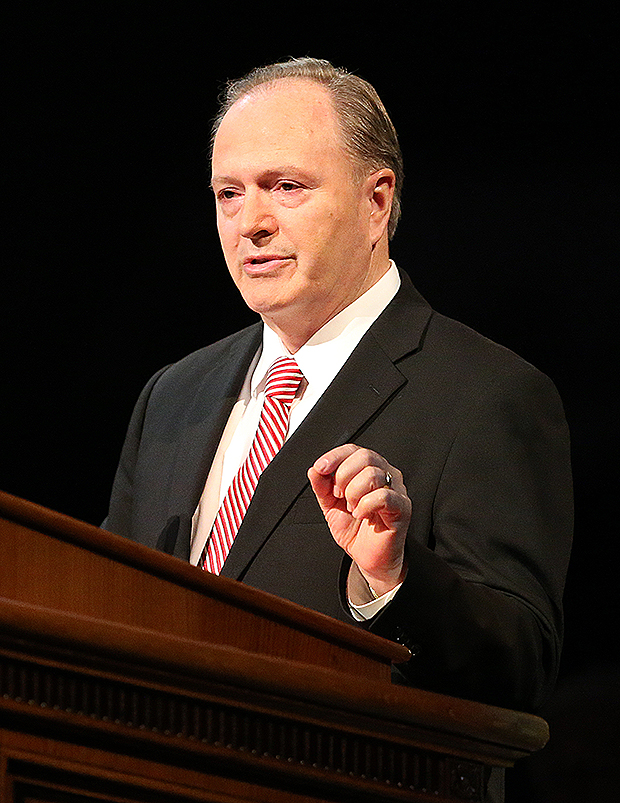Elder Robbins Tells BYU Education Week Participants to “Be Responsible”
Contributed By Marianne Holman Prescott, Church News staff writer

Elder Lynn G. Robbins of the Presidency of the Seventy speaks at a devotional for Education Week at BYU in Provo on Tuesday, August 22, 2017. Photo by Scott G Winterton, Deseret News.
Article Highlights
- You cannot avoid responsibility without also diminishing agency.
- You cannot deny the Lord’s justice without also impeding His mercy.
“The valiant accept responsibility for their mistakes and sins. They repent, get back on their feet, and continue moving forward in faith. They may give an explanation or a reason for their lack of success, but not an excuse.” —Elder Lynn G. Robbins of the Presidency of the Seventy
Related Links
PROVO, UTAH
“Complete and total agency comes with complete and total responsibility,” Elder Lynn G. Robbins of the Presidency of the Seventy told thousands of participants in the Marriott Center and via broadcast during this year’s BYU Education Week.
Held August 21–25, the conference is now in its 95th year. Close to 20,000 people are expected to gather on the university’s campus to learn from more than 1,000 presenters during the week-long conference.
During the Tuesday devotional, Elder Robbins spoke about the conference’s topic, “He that receiveth light and continueth in God, receiveth more light,” focusing on the “very cunning and effective ways that the ‘wicked one’ prevents people from progressing and receiving more light.”

Elder Lynn G. Robbins of the Presidency of the Seventy speaks at a devotional for Education Week at BYU in Provo on Tuesday, August 22, 2017. Photo by Scott G Winterton, Deseret News.
To illustrate this concept, Elder Robbins shared doctrinal pairs—agency and responsibility, mercy and justice—and spoke of how each pair proves one is incomplete without the other.
“When Satan is successful in dividing doctrinal pairs, he begins to wreak havoc upon mankind,” he said. “It is one of his most cunning strategies to keep people from growing in the light.”
Agency and responsibility
“Assuming responsibility and being accountable for our choices are agency’s complementary principles,” Elder Robbins said. “Responsibility is to recognize ourselves as being the cause for the effects or results of our choices—good or bad. On the negative side, it is to always own up to the consequences of poor choices.”
Recognizing there are exceptions—such as innocent little children and the intellectually disabled—Elder Robbins taught that a person is responsible for the use of their own agency and he or she will “reap what we sow.”
Satan’s crafty strategy is oftentimes a sneaky backdoor assault on responsibility, he taught.
“Without responsibility, every good gift from God could be misused for evil purposes,” he said. “Freedom of speech without responsibility can be used to create and protect pornography, for example. The rights of a woman can be twisted to justify an unnecessary abortion. When the world separates choice from accountability, it leads to anarchy and a war of wills or survival of the fittest.”

Elder Lynn G. Robbins of the Presidency of the Seventy speaks at a devotional for Education Week at BYU in Provo on Tuesday, August 22, 2017. Photo by Scott G Winterton, Deseret News.
Mercy and justice
A backup scheme of Satan is to dull or minimize feelings of responsibility. This strategy relies entirely on mercy and denies justice.
“Faith without works, mercy without justice, and agency without responsibility are all different verses of the same seductive and damning song,” he said. “With each, the natural man rejects accountability in an attempt to sedate his conscience.”
Elder Robbins shared a list of things people do or say to avoid being responsible. On that list is blaming others, rationalizing or justifying disobedience, making excuses, minimizing or trivializing sin, hiding or covering up things, fleeing from responsibility, rebelling, complaining, murmuring, finding fault, getting angry, and making demands.
It is important to recognize that excuses never equal results, Elder Robbins said.
“If the anti-responsibility list is so dangerous, why do so many people frequently turn to it?” he said. “Because the natural man is irresponsible by nature, he goes to the list as a defense mechanism to avoid shame and embarrassment, stress and anxiety, and the pain and negative consequences of mistakes and sin. …
“But the valiant accept responsibility for their mistakes and sins. They repent, get back on their feet, and continue moving forward in faith. They may give an explanation or a reason for their lack of success, but not an excuse.”

A woman in the audience takes notes as she listens to Elder Lynn G. Robbins speak at a devotional in the Marriott Center for Education Week at BYU in Provo on Tuesday, August 22, 2017. Photo by Scott G Winterton, Deseret News.
Being 100 percent responsible
Taking responsibility for a person’s own life—even when facing difficulty, trials, or affliction—brings peace and power.
“There is a sense of fairness and desire in each of us that good must prevail over evil, that things lost must be restored, and that broken hearts must be mended,” he said. “Until these things happen there is an injustice gap that is hard for us to reconcile in our minds, even more so in our hearts, leaving us troubled and finding it difficult to move on.”
While people try to reconcile the injustice gap in many ways—revenge, justifying anger and bitterness, seeking legal redress, and imposed consequences—it is ultimately the Lord’s way that true and complete reconciliation occurs.
“Having faith in Jesus Christ is to trust that because of His atoning sacrifice He will correct all injustices, restore all things lost, and mend all things broken, including hearts,” he said. “He will make all things right, not leaving any detail unattended.”
As hard as forgiving may be in difficult situations, not forgiving is even harder over the long run, he said.

Attendees enter the Marriott Center prior to hearing Elder Lynn G. Robbins speak at a devotional for Education Week at BYU in Provo on Tuesday, August 22, 2017. Photo by Scott G Winterton, Deseret News.
“Not forgiving is a synonym with blaming, anger, self-justifying, and self-pity, all things on the list,” he said. “When Satan taps into any of these negative emotions he begins exercising control over their life, even if they are right.”
Elder Robbins recognized there are times choosing to forgive is very difficult. Using the example of the betrayal and cruelty associated with spouse abuse, Elder Robbins spoke of the appropriate responsibility the abused has in the forgiveness process.
Speaking of a hypothetical couple, Elder Robbins walked listeners through the process.
“It seems unjust to ask her to forgive his brutality when he is unrepentant,” he said. “It doesn’t seem fair for her, the innocent one, to be suffering while he, the guilty one, appears to get off scot-free. Is there peace to be found without justice?”
Until the abused learns to forgive, he or she is also denying the justice of God and His ability to judge wisely, the leader taught. Forgiveness doesn’t set the abuser free; rather, it sets the abused free.
“Those who have experienced permanent damage or prolonged suffering or loss from an offense face a far more difficult challenge in forgiving and turning justice over to the Lord,” he said.
But until the abused is able to turn justice over to the Lord, he or she will likely continue to experience feelings of anger and will feel trapped in a recurring nightmare.
“Not forgiving her abuser allows him to mentally torment her over and over and over,” he said.
Elder Robbins spoke of understanding forgiveness by understanding what it is not. Forgiving an abuser does not excuse or condone cruelty, it doesn’t mean a person will forget what happened, and it doesn’t mean that justice is being denied.
Forgiving may not erase injury caused by an abuser, but it does begin to heal the wound and ease the pain. Forgiveness doesn’t mean a person continues to have trust or another chance to abuse a person or children, and forgiveness does not mean forgiveness of sin—only the Lord can do that, based upon sincere repentance.
Being responsible means accepting that a person is in control of his or her own life.
“If others are at fault and need to change before further progress is made, then you are at their mercy and they are in control over the positive outcomes or desired results in your life,” he said. “Agency and responsibility are inseparably connected. You cannot avoid responsibility without also diminishing agency. Mercy and justice are also inseparable—you cannot deny the Lord’s justice without also impeding His mercy. Oh, how Satan loves to divide complementary principles and laugh at the resulting devastation!”
Elder Robbins invited each listener to eliminate the anti-responsibility or anti-faith list from a person’s life—even when he or she is right.
“The day a person eliminates the list from their life is the day they regain control over positive outcomes from that point on, and they begin moving forward in the light at an accelerated pace,” he said.

Crowd members listen and take notes as Elder Lynn G. Robbins speaks at a devotional in the Marriott Center for Education Week at BYU in Provo on Tuesday, August 22, 2017. Photo by Scott G Winterton, Deseret News.

Crowd members listen and take notes as Elder Lynn G. Robbins speaks at a devotional in the Marriott Center for Education Week at BYU in Provo on Tuesday, August 22, 2017. Photo by Scott G Winterton, Deseret News.

Crowd members listen and take notes as Elder Lynn G. Robbins speaks at a devotional in the Marriott Center for Education Week at BYU in Provo on Tuesday, August 22, 2017. Photo by Scott G Winterton, Deseret News.
